T.I.P.s
Oh, Brother! A brief look at sibling relationships in the context of trauma
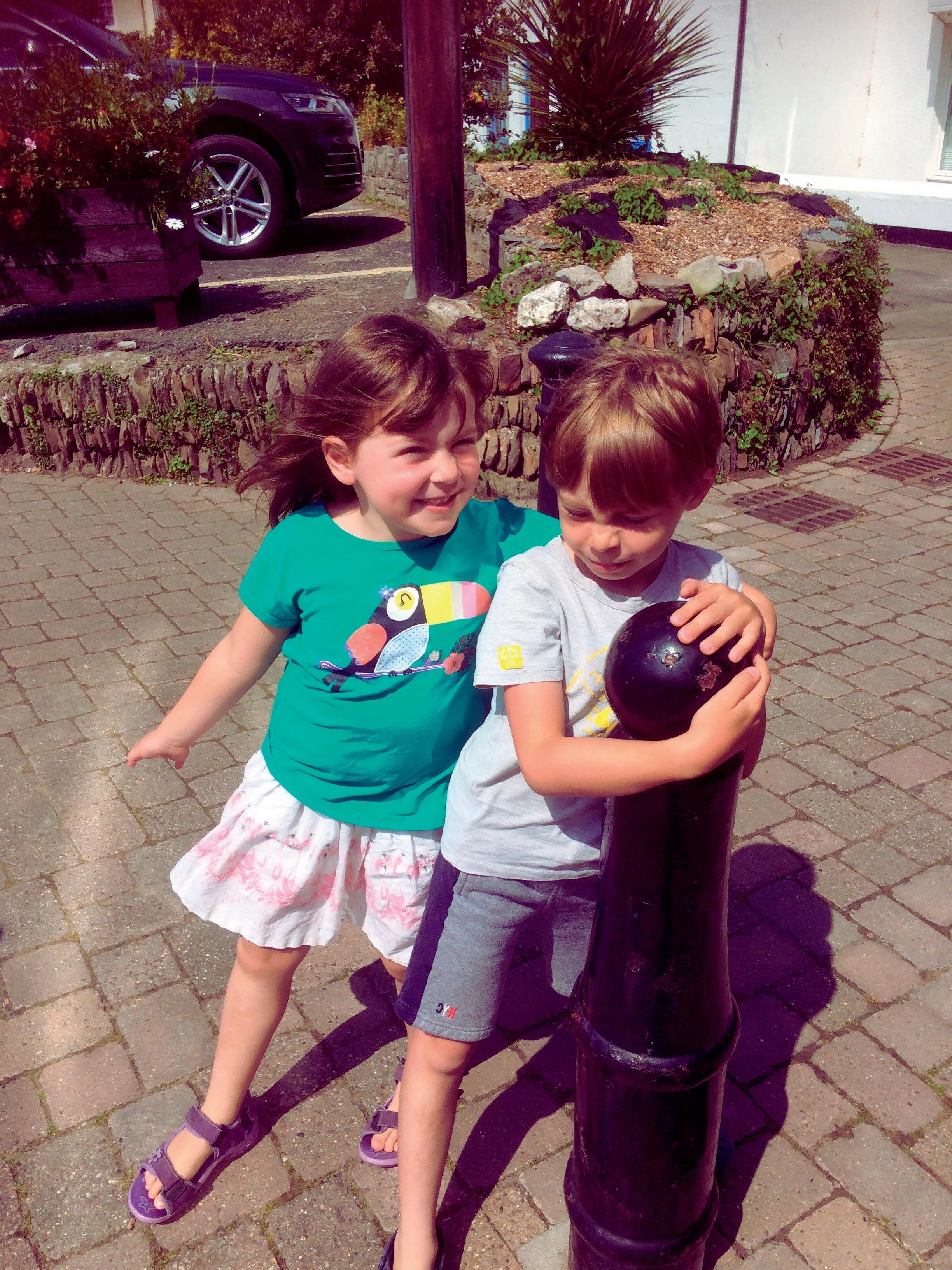
WHAT'S ON?
Events online and in your area

THE TFA –BIG CHANGES IN FOSTERING ASSESSMENT
IT’S OK TO SAY NO –
THERAPEUTIC PARENTS HAVE BOUNDARIES
Trauma Informed Parents CHANGING THE LANGUAGE
Re-thinking terminology
C O E C T E X C L U S I V E M A G A Z I N E ISSUE No. 3 MAY 2023
IN THIS ISSUE:
Photo:: ©CoECT
CoECTNews
Editor'sNote
MeettheTeam!
Oh,Brother!AbrieflookatSiblingRelationships-intheContextofTrauma
BigChangesinFostering:TheBrandNewTherapeuticFosteringAssessment
ChangingtheLanguage-Re-ThinkingTerminology
"I'mNOTaPlacement"
AsktheExperts
It'sOKtosayNo!TherapeuticParentshaveboundaries
MyJourneytoTrauma-InformedCoaching
What'sonWhere?–EventsandConnections
Trauma-InformedQualifications
ListeningCircleViewpoint
CompassionFatigueandTakingCareofYourself
AnnualConference'MakingtheChange-TraumaInformedTeaching' Toadvertisewithuscontact:tips@coect.co.uk

In this issue
www.coect.co.uk ISSUE 3 TIP'S MAGAZINE Page1 Page2 Page3 Page4 Page6 Page8 Page9 Page10 Page11 Page13 Page14 Page18 Page19 Page20 Page22 Page22
COECT News Update
Fostering News!
TRAININGN
AtSAfERFostering,plansaremovingforwardwiththe purchaseofacaravanthatfosterparentscanusefreeof charge.Afterconsultation,theconsensuswasthatnomore than1½hoursdrivingfromWaleswasdesirable
tcoukforafreeconsul
ThisruledoutmostsitesinDevonbutHaveninSomersetfitted thebill.Thereareplentyofactivitieswithintheparkwhich impressedKathrynandAlisonwhovisitedrecently Theagency isdelightedtosaythatitisnowintheprocessofnegotiatinga caravanpurchaseandpitchwithinthisbeautiful,landscaped andwellequippedpark.Thecaravanwillbebothdogand childfriendlyandhavethreebedroomsaswellasan additionalsleepingarea(ifneeded)inthelounge
AtTrueFosteringwehaveanew‘pod’offosteringfamiliesbeing developedinEastAnglia,weareassessinganumberofFP’sintheregion andarelookingformorefosterparentstojoinus.
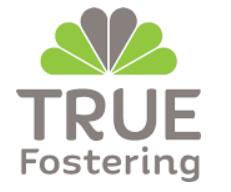

WearealsorecruitingaSocialWorkertosupportthisnewcohortoffoster parents Thiswillalsobesupportedbyourtherapeuticteamwithmonthly professionaldevelopmentgroupsfacilitatedbySarahDillon

NewBookforSchoolscomingout21stAugust!
TheCoECTschoolsteamare excitedtoannouncethattheir newbook'TheA-ZofTrauma InformedTeaching'isnow availabletopreorderon Amazonandthroughother goodbookstores.

Thebookissetoutinasimilar styleofSarahNaish’s'A-Zof TherapeuticParenting',and ispackedfullofstrategiesto supportchildreninthe educationalenvironment
Thebookcanbepre-ordered onAmazonusingthislink tinyurlcom/y6zy6krz

TIP'S MAGAZINE ISSUE 3
1
Editor’sNote
Welcome Everyone!
We are well into May now and Summer is just around the corner! The weather here at HQ has been varied and similar to April showers. We are hopeful of sunnier days to come as we move into Summer and NATP hosts more listening circles and family circles outside.
This edition is packed full of articles including an article on Sibling Rivalry, where we look at navigating family life when therapeutically parenting siblings. We also take a look at the therapeutic parenting ethos, setting boundaries and how it is ok to say 'No'.
To coincide with the increased interest and uptake of the new Therapeutic Fostering Assessment (TFA) we look at how the TFA can benefit fostering families and supporting professionals. Also, our resident Attachment Therapist, and former looked-after child in care Sarah Dillon, explores the terminology of language from a child in care ' s perspective and the need for it to change to support the child's internal working model.
We also have some exciting news from the CoECT Schools Team who have been busy for the past 18 months writing 'The A-Z of TraumaInformed Teaching', which is to be published in August. The book will also be forming the focus of the CoECT conference this year, you can find more details of the book and the conference on pages 1 & 22 of this issue.
As always, we would love to hear from you, so email your thoughts or questions to TIPS@coectcouk
Best wishes
Sair, Sarah and the team at The Centre of Excellence in Child Trauma
ISSUE 3 TIP'S MAGAZINE 2
MeettheTeam!
TheCentreofExcellenceinChildTraumaismadeupofateamofexpertswhohave essentialreal-lifeexperience.WeareAdopters,FosterParentsandBioparentsof neurodiversechildren,andalsoworkasprofessionalsinthefield.
ExecutiveEditor-SarahNaish SarahisaTherapeuticParent,an Adopteroffivesiblings,former FosterParent,retiredSocial Worker,Bestsellinginternational Author,KeynoteSpeakerand founderofthreeIndependent TherapeuticFosteringAgencies.



ExecutiveEditor-SairPenna Sair(Sarah)isaTherapeutic Parent,Trainer, and TherapeuticParentingCoach DirectorofNATP,and IndependentPanelChairfor twoTherapeuticFostering Agencies.



ManagingEditor-KathrynTalbot KathrynworksacrossCoECT, specialisingincommunications andpublicrelations.


Contributor-EmmaEdwards EmmaisaTherapeuticParent, Adopter,DirectorofNATPand TheHavenParentingand WellbeingCentre
Contributor-SarahDillon SarahisaTherapeuticParent,an AttachmentTherapist,Keynote speaker,formerchildincare, Author(TherapeuticParenting) HeadofTherapeuticServices (Fostering).
Contributor-AlisonDouglas AlisonisaTherapeuticParent, Adopter,SocialWorkerand OperationsManagerintwo FosteringAgencies.Alisonis alsoSafeguardingLeadat NATP
Contributor-JaneMitchell JaneisaTherapeuticParent, AdopterandKeynote Speaker,AuthorandHeadof FamilyStabilityintwo TherapeuticFostering Agencies.
Contributor-JessicaJackson JessicaisaTherapeuticParent, Adopter&LecturerinSocial WorkattheUniversityofDerby.
ISSUE 3 TIP'S MAGAZINE 3
Oh, Brother!
A brief look at Sibling Relationships in the context of Trauma
 Written by Jessica Jackson
Written by Jessica Jackson
Sibling relationships can, and often are, our longest lasting and most enduring. However, they can also be the most complex and challenging as we navigate our other relationships both within and outsideofthefamily.
Themostbasiclevelofsiblingrelationship is formed on shared family values, being alike, spending time with, and growing and developing together. This creates opportunities for growth and nurture withinthedyad,butalsoopportunitiesfor conflict and disruption The cycle of ruptureandrepairisessentialtobuilding andmaintainingstrongrelationships,itis recognised, in academia and practice, that strong relationships are less about keeping harmony, and more about how disruptions in the harmony are addressed.
When children grow up in families where they witness healthy attachments, skilful compromise, and adults who can repair disagreements and disruptions; they are more likely to develop a sense of safety and confidence in managing relationships This will be seen in the relationships with parents and siblings but also within friendships and as they growupwithinprofessionalrelationships.
However, where children have been exposedtotraumaticexperiencesinearly life,oriftheysimplyhadparentswhohad themselves not learned how to manage disruption and disagreement, they are more likely to have developed maladaptivecopingstrategiesorwillfeel
unsafeandseerelationshipsand peopleasunpredictable
Itisimportanttorecognisethata coreparent/childattachmentmust besecureandsafeforachildtobe abletohavesecureandsafe attachmentswithothers,including siblings.Thishighlightsthatwhen weidentifydifficultiesinsibling relationships,wecanconfidently formulateanunderstandingof securityintheparentchilddynamic Itgoeswithoutsayingthatthisdoes notmeantheparentisdoing anything‘wrong’orthatthe parentingisharmful,thiscansimply bethatthechildhasexperienced attachmentdifficultiesordisruption prior
Whenthisisconsideredinthemore complexworldofchildrenwhohave experiencedtraumaandareplaced outsidetheirfamilyoforiginthere aremultiplestrandstoconsider. Keepingsiblingstogetheris focussedonensuringchildrendo nothaveadditionallossand bereavement,howeverthesibling dynamicanddifficultiesoccurred throughatraumabond.
Researchsuggeststhatchildren placedwithsiblingshadcomplex
andconflictualrelationships,and thatthereisahigherrateof adoptionbreakdowninchildren placedinfamilieswherethereare alreadybirthchildrenpresentand areneedingtobuildanewsibling relationshiptoo.
Thechallengesfacedwithsiblings whoexperiencetraumaarefartoo vasttoincludeinonearticle, howevertherearesomecore challengesthesechildrenface In familieswheresignificantchange occurredfollowingthebirthofoneof thechildren,suchaschildrenbeing removedafterthebirthofasibling, theotherchild(ren)canholdabelief thattheirarrivalwasthereasonfor thedisruption,andthiscancausea degreeofsubconsciousresentment. Similarly,whereonechildwaswell caredforattheexpenseofthe others,canagainbecomethe sourceofresentment
Similarly,whereasiblinglooksor soundslikeafamilymemberwho causedthemharm,everytimethey arearoundtheirbrotherorsister theirwholesensorysystemcanbe triggeredcausingimmeasurable fearandgriefandaddressingthis canbeachallenge
Tryingtodevelopasecureand lovingrelationshipwithsomeone
ISSUE 3 TIP'S MAGAZINE 4
Photo: ©Victoria Borodinova from Pexels via www.canva.com
youblameforthelossofyourfamily canbeincrediblychallengingand whilsttryingtoreconcileyourown traumaandlifechangesatsucha youngagemakesthisfeel impossible
Somesiblingshavehadtotakeon theroleoftheprotectororcarerand onceinanewhome,this responsibilityisdramatically removedfromthem Childrenfind thischallengingastheyseetheir siblingsastheirresponsibilityand havebecome‘parents’Weneedto safelysupportthesechildrentofind trustandsafetyintheadulttomeet theirsibling'sneedsandthiscanbe challenging
Unfortunately,inmoreconcerning dynamicschildrenaremimicking abusetheyhavewitnessed,are displayingharmfulsexualorphysical behaviourtowardssiblings,orhave definedbeliefsandrolesaround genderinthesiblingrelationships Forthesesfamilies,itcreatesa challengedinkeepingallchildren safe
Whatisimportanttorememberis thatachild’ssafetyisestablishedvia theirprimaryattachmentfigure,in mostcasesthisisthemotheror fatherbutthencanbecomea kinshiporfosterparentoradopter, therapeuticparent.

Eachotherpersoninthehousehold whoisalsobondedorseekinga relationshipwiththatadultbecomes athreattothechild’sattachment withthetherapeuticparent.In severalfamilies,weseechallenging siblingdynamics,thatatthecoreare builtaroundthechildseeingtheir brotherorsisterasathreattothe attachmenttheyhavetothe therapeuticparent
Insuchsituationsworkhasoften beenfocussedaroundbuildingthe siblingrelationship,howeverthe focuscouldberedirectedtothe parentchildrelationshipaswhenthe securityintheattachmentwiththe therapeuticparentimprovesaswill thesiblingrelationshipchange

Thisisatopicshroudedin complexityandoftenshameand blame,thiswillonlyfurtherharm thedynamicsandthefocus needstobearounddeveloping securityandsafetyandmoving forwardwiththerapeutic strategies Want
www.coect.co.uk

To advertise with us contact: tips@coect.co.uk Would YOU like to run a Listening Circle in your area? It's really straightforward and you get FREE membership to NATP! Contact listeningcircles@coect.co.uk to arrange an informal chat
ISSUE 3 TIP'S MAGAZINE 5
to find out more on this topic? Listen to Jessica on the CoECT Podcast Series
THEBRANDNEWTHERAPEUTIC FOSTERINGASSESSMENT(TFA)
 Written By Sair Penna
Written By Sair Penna
Therapeutic Fostering Assessment
Whyweneededachange?
One of the issues in fostering that affects everyone in the team is whenthereisanunplanned
ending and the child has to move unexpectedly This has a huge impact on the child and the fostering family It alsocreatesagreatdealofworkforthe SocialWorkers!
Over the years, at the Centre of ExcellenceinChildTrauma,wehavefelt it to be imperative to tackle the root cause of these breakdowns Many times, we have been involved in advocating for fostering families where an unplanned ending has happened Almost always, the foster parents have spoken about a lack of preparedness and training which was not relevant to thetask
We felt it was essential to overhaul the current process to make it less timeconsumingforSocialWorkers, but yet getting to the absolute heartoftheissue.Thatispreparing applicants for the task of looking after children who have suffered trauma. There is no getting away from that and there is no sugarcoatingofit.
Howwedidit
When we started writing the TFA and associated training, we looked at all the things that were going wrong, or that people had complained about with the system they were using. Sarah Naish had been assessed as a foster parent 35 years ago using the same assessmentasisusedtoday,
althoughtherehavebeenadd-ons and updates We formed a Focus Group made up of Social Workers, Panel members, Foster Parents, Assessors,PanelchairsandAgency Decision Makers. They were unanimous about all the things they didn't like and luckily it seemed to all be the same things! Duplication, not feeling like they had a real sense of the applicant, and most importantly applicants feeling they were not properly preparedforthetaskoffostering.
We felt it was really important to streamlinetheentireprocess.Make sure that all the training was embedded within the Assessment, and we removed the need for furtherbasictrainingwhichmany
ISSUE 3 TIP'S MAGAZINE 6
BIGCHANGESINFOSTERING!
©LAONG from LAONG via www.canva.com
foster parents told us they found to be largely irrelevant. We spent about a year fine-tuning the new Assessment and the integrated Level 2 Therapeutic FosteringQualification


Whathappenednext?
After the pilot completed, Sarah Naish and I became busier due to the high levels of interest from Local Authorities andIndependentFosteringAgenciesin ourTFAandqualification
Why all the excitement? Well, Social workers and administrators are enjoying the more streamlined assessment, which they feel brings out the best in the applicants The TFA speak to the applicants, not about them. This creates an interesting and logical ‘story’ which brings the applicants alive for Panel and makes useofmodernmediatoo.
Applicants find the assessment processtobeenjoyableandinteresting andtheylovethefactthatnotonlycan they complete the training largely online, but its video-based too It's all outsourced to our training company, relieving a great deal of pressure on the social workers and admin team AgenciesandLocalAuthoritiesalsolike the fact that if they want to, they can get groups of applicants together and justjoininthetrainingbyputtingupthe videos we ' ve prepared for them No need for more time spent doing the trainingandPowerPoints
It's been amazing and rewarding to hear the feedback from the Local Authorities and Agencies who have started using the TFA. It's been overwhelmingly positive, and applicants feel much better prepared forthetaskoffostering.
Best of all, we know that this means Foster Parents are professionally qualifiedforthetaskandareprepared for trauma-based behaviours- and thatmeansstabilityforourchildren.
What'snext?
TheTFAlaunchhasbeensosuccessfulitisnowbeingusedinEngland, ScotlandandWales.WearenowworkingonanAssessmentand QualificationprocessforConnected/KinshipCarersinpartnershipwith anEnglishLocalAuthority.
Pleasenote:DuetothedemandfortrainingandlicensingoftheTFA, weonlyacceptoneclientpermonth,sowecanfullysupportthemin thechangeoverperiod.
ISSUE 3 TIP'S MAGAZINE 7 If you would like to know more about Therapeutic Fostering you can listen to our Podcast in the Therapeutic Parenting Series Podcast series 1 Episode 11 www.coect.co.uk/podcasts Toseeourshortinformative webinarontheTFAandintegrated Level2TherapeuticFostering Qualificationyoucanwatchthison thelinkbelow https://tinyurl.com/52u8dax3
CHANGING THE LANGUAGE
Re-thinking Terminology - A child's perspective.
Written by Sarah Dillon
Imagine coming into care and struggling to understand all theterminology
What might these things mean to a child who has no understanding of such terms but quickly has to work them outforthemselves?
1 Carer:apersonwhowillnowlookaftermeandgetspaidfor it.
2 Respite: Going to stay with more strangers cos the ‘carer’ can’tcopewithmeorwantsabreakfromme.
3 Contact: Seeing the people I’ve been taken away from, Mum, Dad etc for a short amount of time in a depressing room at a contact centre Or for some children, contact means having to see the person/people who hurt them as they’retooscaredtosaytheydon’twantto.
4 Placement: not sure what this means yet but sounds a lot like placemat! Maybe it means I’m just staying here for a bit, muchlikealodger
5. Birth children: The special ones who live here. The loved ones
6.Short-term:you’llsoonbeoutthedoor.
7 Long-term:outthedoorat18yrsold
8 Permanence:nevergoinghome
9 Behaviours: All the things I do wrong and prove that I’m bad
10 StayingPut:MightgettostayabitlongeronceI’m18
11.Givingnotice:outthedoorin28days(restassuredI’llbe gonebeforethen)
12.ResidentialUnit:Prisonwhereallthebadkidslivewhono onewants
13.StepDown:Worsethantherest(willbeterrifyingthen).
4 Adoption:Mysister’sbeenadopted She’swantedmore thanme.MoreproofI’mcrap!WillIeverseeheragain?
15 Therapy:Goingintoaroomonmyownwithastranger whowantsmetotalkaboutmyproblemsandwhyIamsuch abadkid(likeI’mgonnadothat)
16 SocialWorkers: people who take you away or yet anotherstrangerwhoisallowedinmybedroomeven though I’m scared and the carer said it’s my private space

Social workers are also adults who make promises andhardlyeverkeepthem.Theyaskstupidquestions likewhataremywishesandfeelings!WellIcaneasily answer that but I don’t My wishes are to not be in care,togetmysisterback,gobackhome(notalways though if very scared), have more chocolate, go to bedlateandplayvideogames Asforfeelings,whatarethey???
17 Supervising Social Workers: More strangers who comeintomyroomaskingthesamestupidquestions then ticking lots of boxes on their laptop with the carer
18 LAC Reviews: obviously I’m lacking something! Stupid meetings with loads of adults who make more promises and never keep them. Scary as well as I don’t know who to sit with With my mum, my Carer mightbeupset,butifIsitwithmyCarer,mymumwill definitelybeupset!
19 Consequences:Idon’tgiveashitewhattheseare,I ain’tdoingthemanyway!Takingstuffoffmeisstupid and it’s not yours so I’ll get you back for it one way or anotherorIprobablydon’tdeservenicestuffanyway soI’lljustbreakit
20. Boundaries: Stupid rules made by idiots. Even if I trytokeepwithinthem,Ican’tkeepitupforlongand thengetanotherstupidconsequence
21 Rewardcharts:MoreproofI’mcrap
22. Panel: Where the carer has to go once a year to seeifhe/shecanstilllookafterme
23. Court: One step before prison where people with strangeclothesandhairdecidewhat’smyfutureis
We must look again at the terminology we use and think about how many of the words we use can depersonaliseachildandminimisetheirexperience ofbeingincare.
ISSUE 3 TIP'S MAGAZINE 8
Photo: ©Deyan GeorgLev from Getty Images via www.canva.com
I am NOT a PLACEMENT!
I am NOT a placement, I’m a vulnerable, innocent child
Not to be depersonalised, insulted and reviled.
I am NOT a nightmare, a burden or a brat I didn’t ask to be here so please don’t call me that.
I am NOT a respite, short-term, long-term match
I am a little person. A frightened one in fact!
I am NOT a solo, I’m the eldest child of three
But due to my behaviours, they’ve granted enhanced fees.
I am NOT a LAC, a Step Down or a Bridge
Chucked around the system like a second-hand fridge!
To live within a family should be my human right And I should never have to ask Where will I sleep tonight?
Poem written by Sarah Dillon
ISSUE 3 TIP'S MAGAZINE 9
Haveyouwatchedtherecordedversionof "IamNOTaPlacement"? YoucanfindtherecordedversionofthepoembySarahDillonproducedbyCoECTat https://www.youtube.com/watch?v=AyJ6g9B6dFI
ASKTHEEXPERTS
Letourteamofexpertswithfirst-handexperience,guideyouthroughsomeofthosetrickyTIP moments!
My 8-year-old adopted daughter seems to panic every time I am out of her sight She needs so much reassurance and bedtime is a nightmare Can you help please?
TC Epsom
SarahDillon replies:

Childrenwhohaveexperiencedtraumaandneglect havenotdevelopedobjectpermanencesufficiently. Thismeansthatanolderchildwhoisincarecanreexperienceasenseofabandonmenteverytimetheir primarycaregiverisoutoftheirlineofsight Object permanencetypicallystartstodevelopbetween4 and7monthsofageandinvolvesababy’s understandingthatevenwhentheycan’tseean object,itisstillthere Beforethebabyunderstands thisconcept,thingsthatleavehisviewhaveceased toexist.Asaresultofthis,achildmayfollowus everywhereormayconstantlychatterandask nonsensequestionsthroughfearofinvisibilityand fearofbeingforgotten
Often,thesechildrenhavenumeroussleepissues Theymaystruggletogotosleepatnightbecause theyintrinsicallybelievethatwhentheadultleaves theroomtheyarenolongeravailableforthem, particularlyifnobodyconsistentlygotuptothemin thenightwhentheywerebabies.
Achildmayrepeatedlysay‘hello’toanadult whenevertheywalkbackintoaroomafterabrief absence(forexampleatoiletbreakortomakea cuppa),asifthey’vebeenawayforasignificant periodoftime
Wemayalsoseeproblemsinschoolbecauseonce wehaveleftthechildatschooltheystruggleto believethatwestillexistand,indeed,thatwewill returntocollectthemattheendoftheday
Whenweexplorethisfurtheritisunderstandablethat, duetotherupturedattachmentthechildhasbeen conditionedtobelievethatadultsaretemporary figures
Adultsdon’tstickaround,andwhentheyleavethey’re goneforever
Somehelpfulstrategiesmightbe;
Using narratives: Letting them know that you can see they are worried that you have forgotten them andremindingthemthatyouhaven’t
Sandtimersatnightoracolouredclockintheroom: Using a sand timer to help the child to go to sleep Let the child know that once the sand has fallen through,wewillreturn Gobackintothechild’sroom for a minute and connect with them before turning the timer over again This helps the child to know thatwhenweleave,wealwaysreturn
Sing or make noise when you are downstairs and thechildisinbed Thishelpsthechildtorealisethat youstillexist/haven’tlefteventhoughtheycan’tsee youandthatnothingbadishappeningtoyouwhilst theyareinbed.
A photograph of you at school because you miss themasopposedtothemmissingyou!
Havingsomethingthatsmellsofyou
Drawaheartonyourwristandalsoonthechild’sto remindthemthatyouaretherewhentheyareaway fromyou
You can find more useful strategies like this in our Therapeutic Parenting Podcast series which can be foundatwww.coect.co.uk/podcasts
ISSUE 3 TIP'S MAGAZINE 10
IT'S OK TO SAY ‘NO’!
Therapeutic Parents have boundaries
 Written By Sarah Naish
Written By Sarah Naish
RecentlyIwascontactedbya memberofNATPwhosaid,“I can’t do therapeutic parenting because I can't just sit here and empathise withmychildwhiletheyhit
me”! I said, “Good, because that is NOTTHERAPEUTICPARENTING”!
At our Listening Circles and training events, parents often express confusion, (in relation to boundary setting), between ‘Gentle Parenting, Standard Parenting, Therapeutic/ Trauma InformedParentingandalsowhatIrefer to as ‘Unsafe Parenting’, which I will describelater.
The boundaries which we put in place need to be very firm. The Therapeutic Parent cannot allow a child to do something today, which he was not allowed to do yesterday, or vice versa. Any changes to boundaries need to be done slowly and carefully as the child develops. In our book ‘The Quick Guide to Therapeutic Parenting’, Sarah Dillon andIdescribedtheneedforboundaries likethis:
‘Often our children have had a very difficultstartinlifeandareunsureabout
what is and is not ok. (It feels as if) suddenlytheyareploppedontopof a new ‘cliff top’, with no idea about what the rules are It can feel like trying to navigate the top of a cliff blindfolded!
It is tempting to overcompensate and ‘make allowances’ leading to UNSAFE parenting. Unsafe parenting might allow children to ‘fall off the cliff’bypermittingwithoutchallenge, violence, aggression, rudeness, conflict and extreme behaviours but avoids(the)parentexpressinganger and reinforcing boundaries, instead using misplaced empathy in all situations

TherapeuticParentingDOESNOT!Our children NEED us to be the unassailablesafebase Tobestrong through instruction and direction wheretheboundariesare,andtobe clearwiththemaboutwhatis,andis NOTok
As Therapeutic Parents we respond empathically and with nurture, often metaphoricallyholdingupamirrorto ourchildren’sbehaviour,butthis
doesnotmeanthatweare‘toosoft’ andconfuseourchildrenbynot beingclearaboutourexpectations ofthem.
Mychildrenwouldhavedescribed meas‘strict’or‘nononsense’.Well,I was Iwas‘theunassailablesafe base’ Thismeantthat‘nomeantno’ andthechildrencouldrelyonwhatI saidanddid So,forexampleit'sok toshowangerandsayloudly'Stop thatrightnow'BUTthenwemove swiftlytorepair 'It'sok/you'resafe/ I'vegotyou/Istillloveyou'etcbut thatbehaviourisnotacceptable'
Illustration from The Quick Guide to Therapeutic Parenting Naish/ Dillon JKP TIP'S MAGAZINE 11 ISSUE 3
Illustration from The Quick Guide to Therapeutic Parenting Naish/ Dillon JKP
We TELL our children what we expect, we don'taskthemie 'It'stimetolaythetable Thank you!' Not 'Please can you help me andlaythetable?'
Trauma-informed parents also tend to implement a strong routine from the outset Thisisanintegralpartofboundary setting. They may not have planned to have such strong routines, but they do so due to the identified needs of their child These routines are largely inflexible, as the purpose is to allow the child to feel safe and to be able to predict their life, maybe forthefirsttime
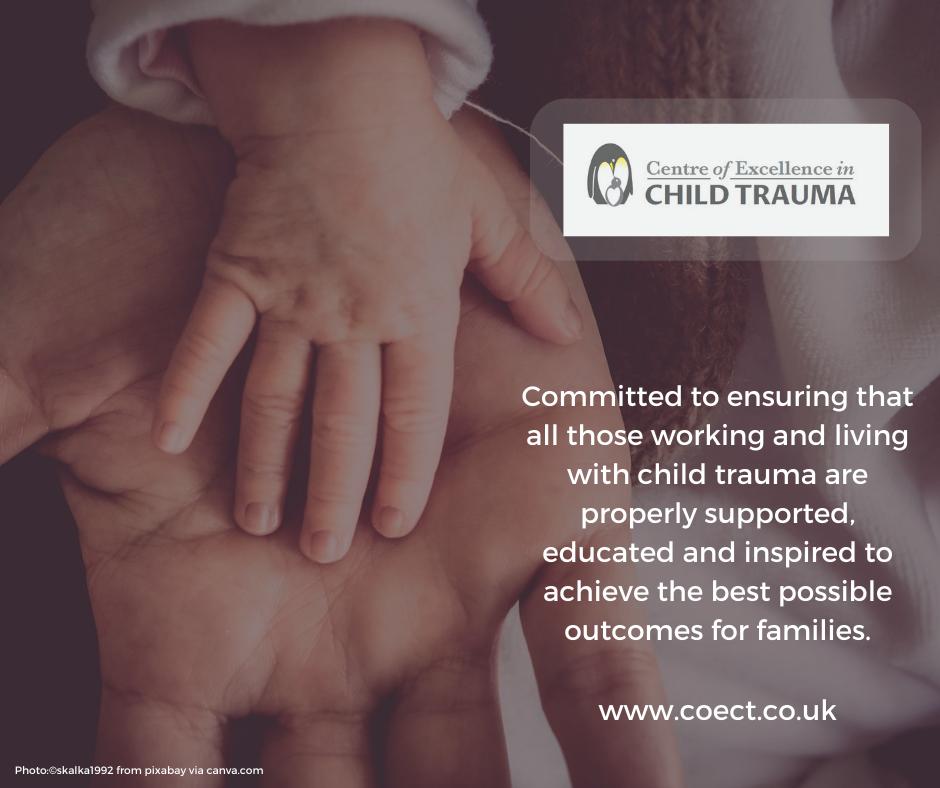
The Therapeutic Parent has to be seen to besafe,secureand‘incharge’atalltimes. Thinkserenity!Expresseddoubtwillleadto feelingsofinsecurityinthechildandavery fast decline into chaos and fear I often considered myself to be the steam train, runningalongthetrack,pullingmyfivelittle carriages The carriages would do their best to ‘de rail’ me or jump onto an adjacent track and start going off at a tangent. Part of the conscious, therapeutic response is about staying on track and keeping on moving forwards This is what keepsth
Iknowweoftenhavechildrenwheredifficultbehavioursare entrenchedalready Wehavetostarthowwemeantogoon Firm boundariesusingnaturalorlogicalconsequencestobuildconnection andcauseandeffect WITHnurtureandrepair
Icanalmosthearyouallsayingnow,‘Butwhataboutwhentheybreak aboundary?WhatdoIdo’?Wellthen,itsallaboutconsequences Andthatisforanotherarticle!
The Quick Guide to Therapeutic Parenting gives you some great bite sized essential tips, in the form of easy to remember analogies and illustrations. Available from Amazon, Jessica Kingsley Publishing and all good book shops.

TIPS MAGAZINE 12 ISSUE 3
Our children often behave in unacceptable ways. It is our job to steer them using clear direction and strong boundaries
My journey to trauma-informed coaching
 WrittenbyLauraTaylor
WrittenbyLauraTaylor
Ididn’t really know what I wantedtodowhenI“grewup” but I knew it had to involve people and not products. My earlycareerwasinlocal government administration which led to an admin role in Children’s Services. From there, listening to social workers, parents and foster parents made me realiseIwantedapieceoftheaction!I movedfromadmintofamilysupportto student social worker and being qualified in a short space of time. I loved working with families but loved working with foster parents more It meant the last 7 years of my career has been assessing and supporting them.
During this time I could see a clear difference in those carers who really “got”traumaandthosewhodidn’t Not to mention the effects this has on the children in their care. I was lucky enough to hear Sarah speak at our Annual Fostering Conference in 2018 and it was safe to say I was hooked! I felt like a sponge that day, absorbing the knowledge and anecdotes they shared, vigorously making notes on how I would approach certain behaviours with foster parents and how I would encourage them to read the books and watch the YouTube videos I read the books cover to cover and was so proud of how my practice waschangingforthebetter ButIknew therewasmoretocome
In 2021 I was funded to undertake the Level 3 Therapeutic Parenting Diploma and then the coaching units to completemyqualification Icompleted roughly one unit a month and as I continued to work with foster parents, I found I was sharing information and educatingthemmorethanIthought
was possible. It adapted the way I held conversations during supervision sessions and gave me the confidence to challenge other professionalsandseniormembersof staff when I could see that a trauma informedlenswasnotbeingusedon achildincare
What fascinated me most was the insight I gained into compassion fatigue. Having a clear understanding of the difference betweenthisandblockedcarereally helped me to pick apart the barriers for some of the carers I worked with as well as consider how to create more balance in their lives to really flourish in providing care for the children in their homes The saying “you can’t pour from an empty cup” neverfeltmorereal!
Similarlymylearningofhowtraumais often mistaken for a diagnosis was takenfurther.Usingcomparisontables and case studies to think about whetherachildreallyhadASD,PDAetc or if we were seeing trauma related behavioursandsurvivalstrategies,was agreathelpinhowIsupportednotjust fosterparentsbutmycolleaguestoo
Gettingthemtoconsiderthebasicsof therapeuticparentingwithintheircare andbeingconsistent,the"unassailable safebase”,wassoimportant
As my role developed into recruiting and training new foster parents I was able to include things like the impact oftraumaonthebrain,theuseofPACE and the importance of empathy into thepre-approvaltrainingcourse
It really helped me to see who understood and who needed more support to change their parenting style
Duringthecoursetherewasagood varietyoflearningpackages includingvideos,quizzes,research andcasestudiestohelpmedevelop myknowledge.Thecoachingunits thenallowedmetoapplythetheory topracticewithsomereallifecases I wasabletoworkwithafosterparent andanadoptivemothertosupport them,consideringtheirgoalsand desiredoutcomes.Therewasalso opportunitytothinkabouttheirown self-caretoavoidcompassion fatigueandevidencemycoaching skillstocompletethequalification
ThesupportIwasofferedasalearner wasgreat Bothmyassessorswere readilyonhandtoanswerany questionsIhadorproofread assignmentsthatIfeltneededsome morework.Theyalsointroducedme totheprivateFacebookgroupwhich hasotherlearnersinsowecouldall offereachotherpeersupportwhen needed Itfeltgoodnottobeisolated inmylearning
Since completing the course I have been offered the fantastic opportunity to become an associate trainer with Inspire Training and The Trauma Revolution It has been great to offer my knowledge and expertise around various trauma related behaviours and challenges for parents/carers. Whether it’s a one hour webinar or a half day course, the skills I gained on my journey to becoming a coach are put to good useandIlookforwardtoworkingwith membersofthegroupforalongtime yet
MoreinformationontheTraumaInformedCoachingpathwaycan befoundonpage18ofthisissue
TIP'S MAGAZINE
13 ISSUE 3
WHAT'S ON? COECT EVENTS
May - July 2023
PEERSUPPORT-VIRTUAL LISTENINGCIRCLES
VirtualListeningCircleDates20thMay–31stJuly2023
Monday5thJune2023–VirtualListeningCirclefor Australia https://tinyurlcom/286pkbn4
Monday3rdJuly2023–VirtualListeningCirclefor Australia https://tinyurlcom/2e946ys2
Friday14thJuly2023–VirtualListeningCircleHostedby MichaelaAshby https://tinyurlcom/4zmusr25
FAMILYCIRCLES
FamilyCircle:
Thursday1stJune2023–SouthAustraliaFamilyCircle https://tinyurlcom/4mwym8tp
Thursday29thJune2023–SouthAustraliaFamilyCircle https://tinyurl.com/yzuv63cn
Monday31stJuly2023–GloucestershireFamilyCircle https://tinyurlcom/49rwvzcz
PEERSUPPORT-IN-PERSON LISTENINGCIRCLES
In-PersonListeningCircleDatesfrom20thMay–31st July2023
Monday22ndMay2023–Surrey(Farnham)Listening Circle-https://tinyurlcom/4wt29hmp
Monday22ndMay2023–CumbriaListeningCirclehttps://tinyurlcom/yc3eyzn5
Monday22ndMay2023–SurreyWalkandTalkhttps://tinyurlcom/yudumr7s
Monday22ndMay2023–GloucestershireListening Circle-https://tinyurl.com/c3a5se75
Thursday25thMay2023–NorthamptonshireListening Circle-https://tinyurl.com/mryzvewr
PEERSUPPORT-IN-PERSON LISTENINGCIRCLES

In-PersonListeningCircleDatesfrom20thMay–31st July2023continued
Friday2ndJune2023–SomersetListeningCircle https://tinyurl.com/c3a5se75
Tuesday6thJune2023–SouthAustraliaListening Circlehttps://tinyurlcom/387fft7n
Monday12thJune2023–Surrey(Farnham)Listening Circlehttps://tinyurlcom/y499v2wm
Tuesday13thJune2023–CambridgeshireListening Circlehttps://tinyurlcom/5he8km3f
Tuesday20thJune2023–SurreyWalkandTalk https://tinyurl.com/mrxjmrvs
Friday23rdJune2023–Surrey(Farnham)Listening Circle https://tinyurlcom/3uu3se2e
Monday26thJune2023–CumbriaListeningCircle https://tinyurlcom/526bnzn6
Wednesday28thJune2023–Gloucestershire ListeningCircle https://tinyurlcom/ykhrhz3t
Friday7thJuly2023–SouthAustraliaListeningCircle https://tinyurl.com/2p93dt9w
Friday7thJuly2023–SomersetListeningCircle https://tinyurlcom/2s39h6hu
Tuesday11thJuly2023–CambridgeshireListening Circlehttps://tinyurlcom/y72n32dm
Monday17thJuly2023–SurreyWalkandTalk https://tinyurlcom/5462zwxr
Monday17thJuly2023–Surrey(Farnham)Listening Circlehttps://tinyurl.com/3k5cxb79
Calling all Nurseries, Schools, Social Work Fostering & Adoption Teams!
Corporate Membership also available for Peer Support and Training through a combined package - For more information email natp@coect.co.uk




TIP'S MAGAZINE 14 ISSUE 3
WHAT'S ON? COECT EVENTS
May - July 2023
WEBINARS
Friday26thMay2023 10am-2pm(GMT/UK)
£10perpersonLiveAccess
TheA-ZofSurvivalStrategiesWebinar withSarahNaishandSarahDillon
JoinSarahNaish(adopteroffive,TherapeuticParenting Expert)andSarahDillon(LeadingAttachmentTherapist, ChildTraumaExpert)foraliveonlineconference It'sallaboutYOU.



Howtocarryonwhenyoufeelyoucan’tcarryon Managinggrief,anxietyandanger ·Strategiestofeelbetter
Goon,putthekettleon,putyourfeetupandjoinus It won'tbeheavygoingandtherewillbesomefunand laughteralongtheway.
Formoreinformationandtobookgoto tinyurlcom/39mmpdeb
TRAINING
BRANDNEWCOURSE-ResidentialChildren’sHomes TraumaInformedStrategiesforChange–Live InteractiveWorkshop
WithSarahNaish&SarahDillon
Formoreinformationpleasecontactinspire@coect.co.uk
Trainingisavailableinotherlocationscontact inspire@coectcouktoregisteryourinterest
ChildtoParentViolence
TherapeuticParenting
CompassionFatigueTraining
Viewourfullrangeoftrainingcourseswhich include: andmanymore
Visitwwwinspiretraininggroupcomoremail inspire@coectcoukforaconsultationonour bespoketrainingpackages
Trainingisavailableinotherlocations,contact inspire@coectcouktoregisteryourinterest
TIP'S MAGAZINE 15 ISSUE 3
WHAT'S ON? COECT EVENTS
May- July 2023
ONLINETRAINING
TraumaRevolutionWebinars
MessyBedrooms–18thMay,12noon-1pm(GMT)
Doesyourchildleavetheirroomsextremelymessy, untidyordirty?Thelevelandscalemaybefarbeyond therangeofacceptabletidiness.Joinustohavealook atthemanyreasonsthismaybehappeningand preventativestrategiestohelpyoualongtheway
NonsenseChatter–26thMay,12noon-1pm(GMT)
NonsenseChattercanbereallydraining!Itisimportant torememberthatnonsensechatterandquestioningis veryoftentodowithayoungeremotionalageandis oftenseenlater,andforsignificantlylongerinchildren whohavesufferedtrauma Wewillbeprovidinguseful strategiestohelpyou,endingwithaQ+Atoaskany questionsyoumayhaveaboutthis!
Obsessions–30thMay,10am-11am(GMT)
Obsessionsoftenhappenbecauseourchildrenstruggle tobestilland'comfortableintheirownskin’Whenthey arestill,thetrauma,anxietyandemptinessseembigger andmakethemfeeluncomfortable,driventoactionand tofindadistraction Joinusforthislivewebinarwith manyusefulstrategiessurroundingobsessions
PooIssues–9thJune,12noon-1pm(GMT)
Thisiseasilythetopic(alongwithwee)thatweget askedaboutthemostonourTherapeuticParenting FacebookGroup!Itcanbeexhausting,long-standing anddifficulttocopewith!Joinusforalive1-hour informalchatandQ+Alookingatwhythismightbe happeningandwaystohelpbothyouandyourchildto copewiththis.


Rejection–16thJune,12noon-1pm(GMT)
Rejectioncanbereallydifficultwhenyourchildissaying hurtfulthingstoyouhowevertherearemanyreasonsas towhythismaybehappening Joinusforsomeuseful responsesandstrategiesandachancetoaskyourown questionsandchatwithourtrainers!
Rudeness–23rdJune,12noon-1pm(GMT)
Sometimesourchildrenmaycomeacrossasrudewhen theyareanxiousorfrightened,inthissessionwewillbe exploringthedifferentreasonsthismaybehappening andprovidingyouwithmanystrategiesforbefore, duringandafter!
Sabotaging–28thJune,10am-11am(GMT)
Itisimportanttorememberwhenyourchildsabotagesa dayoutoranexcitingeventordestroysapreciousgift,it doesnotcomefromawell-thoughtoutplantoruin everything Itwon’talwaysbelikethis!Butitwillbeuntilour childrencanbelievethattheyareworthwhatwegive them JoinusinthissessionforaninformalchatandQ+A foranyburningquestionsyoumayhave!
SchoolIssues–7thJuly,12noon-1pm(GMT)
Oneofthequestionswearemostfrequentlyaskedis‘How doIdealwithmychild’sschool?’Manytherapeutic parentsfeelfrustrated,undermined,anddisempowered bywellmeaningteachingstaff,whostickfirmlytotried andtestedmethodswhichseemtoworkwellwithsecurely attachedchildren Weknowthatstandardparentingdoes notworkforourchildrensostandardteachingmethods won’teither!Joinusforstrategiessurroundingthisanda LiveQ+A
SelfHarm–14thJuly,12noon-1pm(GMT)
ThewaywereacttoearlysignsofSelf-Harmcanhavean extremelysignificantimpactonthedevelopmentof longer-termissues!Inthissessionwewillbetouchingon preventativeandimmediatestrategiestohelpyouand yourchildren.
SeparationAnxiety–19thJuly,10am-11am(GMT)
Ourchildren’sstressandanxietyaroundseparationand theiroverwhelmingneedfornurtureandsafetycanbe suffocatinganddifficulttomanage Askyourself‘Why doesthisneedtobechanged?’itmaynotbeaboutyour child’sbehavioursomuchasyourneedtohavesome space,thatiscompletelyunderstandable!JoinSarah Naishformanystrategiestohelpyoumovingforwardwith this!
SexualizedBehaviours–28thJuly,12pm-1pm(GMT)
Itcanbeveryfrightening,evenhorrifying,tocomeacross averyyoungchildwhois,or,appearstobe,sexually knowledgeableandactive;butifwecanputasideour ownhorrorandrevulsionandseewhatthebehaviouris reallytellingus,wecanatleaststartoffwiththeright mindset
Tobookoneofthesewebinars,orfindoutmoreaboutthe TraumaRevolutionTrainingPassclickonthislinktoour website:https://wwwtraumarevolutioncouk/events
TIP'S MAGAZINE 16 ISSUE 3
WHAT'S ON? COECT EVENTS
May - July 2023
WELLBEING,COACHINGANDTHERAPY THEHAVENPARENTINGANDWELLBEINGCENTRE



StaffWellbeingSessions
Perfectforself-developmentonaninsetor trainingday
Sessioncanhelptointerruptthesymptomsof compassionfatigue,usingacombinationof coachingmethods,aspectsofmindfulnessand othertherapeutictechniques
Thesessionenablesindividualstoacknowledge factorswhichcanbecausingcompassionfatigue, anddevelopaself-caretoolkittoenablethemto focusonpreventingaspectsofcompassion fatigueandpromotingtheirwellbeing
IndividualandSmallgroupsessionsavailable,eitherIn-personasaDayRetreatformatoravirtual wellbeingsessionheldthroughanonlineplatform
Formoreinformationgotowwwthehavencentrecouk/services
Areyouexperiencingadisconnectiontoyourchild?
3StepstoConnect™(3SC)isaground-breaking processwhichcanbeusedinanysituationwherea parentisstrugglingtocope.ThismaybeduetoChild toParentviolence,Overwhelmingbehaviours, Secondarytrauma,Compassionfatigue,ora disconnectintherelationshipbetweentheparentand child.

Thisspeciallydesigned3-stageprogrammeiswhat parentsoftraumatisedchildrenneedtorediscover theirinnercalmandreconnecttotheirchild.Parenting childrenfromtraumacanbedrainingandexhausting, weunderstandtherelentlesspressuresyouface.
Formoreinformationgoto www.thehavencentre.co.uk/services
TIP'S MAGAZINE 17 ISSUE 3
TRAUMA INFORMED QUALIFICATIONS
ThroughInspireTrainingwehaveasuiteofqualificationstosupportparentsand supportingprofessionalswhoworkwithchildrenwhohaveexperiencedadverse childhoodexperiencesandneurodivergentchildren.
Level2SAfEParenting:ATherapeuticParentingApproach
ThisisaLevel2onlinecustomisedqualificationaccreditedbynationally recognisedawardingbodyCACHENCFEundertheirCACHEaccreditation Cantakeupbetween3-6monthstocomplete.
Perfectforindividualswhowanttolearnandimplementtherapeutic parenting.
Level3TherapeuticParentingProgramme
ThisisaLevel3onlineInspireTrainingGroupqualificationforthoselearners lookingforadetailedintroductiontotherapeuticparenting
ThishasaprogressionroutetotheDiplomainTherapeuticParenting accreditedwithNCFECACHE
Level3DiplomainTherapeuticParenting
ThisisaLevel3onlinecustomisedqualificationaccreditedbythe nationallyrecognisedawardingbodyCACHENCFEundertheirNCFE accreditation Itcoversbasicandadvancedstrategiesoftherapeutic parentingandtakesayeartocomplete
ThishasaprogressionroutetotheAwardinTherapeuticParentCoaching accreditedwithNCFECACHE
Level3Award/DiplomainTherapeuticParentCoaching
TwonewadditionstoourqualificationsistheLevel3onlinecustomised qualificationaccreditedbynationallyrecognisedawardingbodyCACHE NCFEundertheirCACHEaccreditation.Thisenablesthelearnertogainthe knowledgeandcoachingtechniquesinordertobecomeatherapeutic parentingcoach.




Pleasenote:Apre-requisitefortheAwardistheLevel3Therapeutic ParentingProgramme.
Formoreinformationonourqualificationsgoto wwwinspiretraininggroupcom/qualifications
TIP'S MAGAZINE 18 ISSUE 3
ListeningCircle Viewpoint
This issue we meet Sara Dowling, Volunteer Support Administrator at NATP
 WrittenBySaraDowling
WrittenBySaraDowling
Hello,I’mSaraandIamtheVolunteerSupport AdministratoratNATP Istartedworkingpart-timeat NATPinNovember2022 Myjobroleistosupportour volunteerListeningCircleCoordinators(LCCs).This includessupportingthemastheystarttheirjourneyto becomeanLCC,byspreadingthewordaboutour upcomingvolunteerinformationsessionsand facilitatingtheinformationsessions
Afterthat,ifsomeonedecidesthattheywouldliketo becomeanLCC,Isendthemtheapplicationformand gothroughtheprocesswiththem Oncetheyhave becomeanLCCandsubmittedabookingformtoruna ListeningCircle,thenIwillgettheinformationaddedto ourwebsiteandadvertisedonourFacebookgroups.I alsosendoutregionalemailsaboutupcomingListening Circlesandorganisingvolunteercatch-ups These catch-upsaretomakesurethattheirListeningCircles aregoingwell,answeringanyquestionstheymight haveandmakingsurethattheLCCsfeelsupported
IstartedworkingatNATPafterIwasvolunteeringfor15 monthsfortheCentreofExcellenceinChildTrauma (COECT).Myrolewastoassistwithshopproductsand enquiries,andothertaskssupportingmemberservices
OurListeningCircles
ListeningCirclesaresupportgroupsforourmembers Theycaneitherbeface-to-faceorvirtualviaZoom.Our face-to-faceListeningCirclesincludecoffeeandcake catch-upsandwalksandtalks OurVirtualListening CirclesincludesubjectListeningCircles,suchasfor birthparents,adoptersandSGO/Kinshipcarersetc SomeLCCsalsorunFamilyCircles,sothatour member'schildrencanmeetwithotherchildrenand theparentsfeellessjudgementbeingsurroundedby otherparentsthatunderstand.WehaveListening CirclesandFamilyCirclesallovertheUnitedKingdom andinAustralia
IrunaListeningCircleinGloucestershireeverymonth withmycolleagueShannon Wegotodifferentvenues forcoffeeandachatandtomeetnewmembers. Once aListeningCirclehasestablishedmemberswethen handthereinsovertoavolunteertoco-ordinatethe ListeningCircle,givingthemsupportwhenneeded.
VolunteerRecruitment
Wearecurrentlyintheprocessofrecruitingfor newvolunteerListeningCircleCoordinators Ifthis issomethingthatyouthinkyouwouldbe interestedin,ournextvolunteerinformation sessionisonTuesday13thJuneat12noon To bookon,visit https://tinyurlcom/5n8w76b5
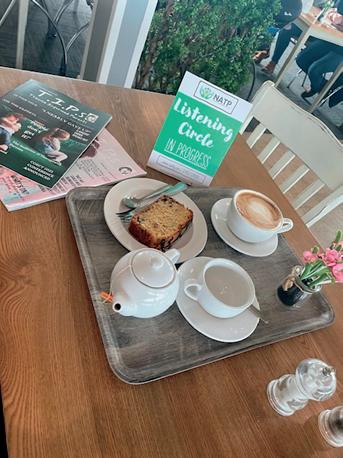
If you are interested in joining our Listening Circle, and either live in the area or are visiting the area, visit NATP’s events page -
https://tinyurl.com/y34x8fzn

ISSUE 3 TIP'S MAGAZINE 19
Photo: ©COECT
Compassion Fatigue and Taking Care of Yourselves
WrittenByEmmaEdwards
Doyouevergetthatfeelingofdread whenyouarriveathome?
Doyouslowlygatheryourthings delayingyoufromenteringthehouseas youarenotsurewhatawaitsyou?
Exhausted-MentallyandPhysically tired,havefeelingsofOverwhelm,feel anxiousaboutthings,orsufferfrom sleepissues?
Anyofthesesoundfamiliar?
ThesesymptomsrelatetoCompassion Fatigue,astressresponseinindividuals causedbylookingafterandsupporting otherswhoaregoingthroughdifficult andtraumaticperiods.Itcanpotentially affectanyoneinacaringroleandcan createphysicalexhaustion,alsoknown asburnout.
Othersignsandsymptomsmaybea lackofmotivation;individualsmayfeel lessefficientinwhattheyaredoingand lackempathytowardsthepersonor personstheyarecaringfor.Theymay alsofindthattheyemotionallydistance themselvesfromothersandfindit difficulttoconcentrateorremember things
Compassionfatigueisyourbody'sway ofcopingwithstresswhenyour compassionforothersisoverusedand yourempathylevelsdeplete Itdrains youremotionalandphysicalenergy; individualsmayfindithardtoshow empathytowardsothersandstruggleto accesstheirlogicalthinking
Youmayfindyoustarttodistance yourselffromtheindividualandput barriersupsothatyouarenotableto connectonanempathiclevelwiththat person
CompassionFatigueismainly associatedwithfrontlinestaffinthe healthandcaringprofessions However, thepastcoupleofyears therehasputextrapressureon teachersandothersupporting professionalswhoareworkingwith childrenandyoungpeoplewho haveexperiencedtrauma
Sowhydoesithappen?
Helpingorcaringforsomeonecan beveryrewardingbutcanalsobe drainingemotionallyandphysically, thiscanbemagnifiedwhenthe individualhascomplexneedsand hassufferedtrauma Thelackof downtime,restandsupportcanall contributetothecaregiverentering CompassionFatigue
TheGoodNews!
Therearewaysofrelieving CompassionFatigue Beingaway fromasituationwhichiscausingthe stressresponsecanhelpyouto becomeresilient Thismaynot alwaysbepossiblebutaimingfor justfiveminutestostartwithwillhelp.
Tryandbuildupthistime,sothatyou achieve30-60minutesdedicatedto ‘you’aday Youmaythinkthisis impossibletostartwithbut rememberthebiggerpicture,there are24hoursintheday,wearejust askingyoutobuildupto1hour.Ifit helpsmakeitaquestyouneedto achieve!
AttheHaven,wealsouseapsychosensorytechniquecalledHavening whichisbasedonneuroscience

TheHaveningTechniques®,reduce anxietyandstressassociatedwith negativememories Italsohelps individualstofeelcalmandrelaxed andcanbeusedasaselfregulationtool
WhatcanIdotoprevent CompassionFatigue?
HealthyLifestyle–Creatinga healthybalanceinyourlifewill helpwiththepreventionof compassionfatigue
Lookafteryourself–Itsounds easybutwhenlifegetsinthe wayitisalsoveryeasytotake shortcutswhichcanspiralinto orderingonetoomany takeawaysaweek,eating copiousamountsofjunkfood etc Overtime,thiscanleadto anunhealthypatternofeating Beingmindfulaboutwhatyou eatcombinedwithbeingactive canhelp
Maketimeforyourself–this allowsyoutode-stress;ifyou strugglewithmakingtime,try bookinganappointmentwith yourselftodoanactivityyou enjoy Gettingoutdoorsinthe freshaircanhavemany benefitsincludingkeepingyou activeandhelpingtoclearyour mind Whateveryouchooseto do,stickwithit;willpowerand stickabilityarethewayforward AwarenessofGratitude–shiftingthenegativebias As humanbeingsweare programmedwithanegative
ISSUE 3 TIP'S MAGAZINE 20
bias,itwarnsusofdangerand keepsussafe.However,feeling negativecanalsobreednegativity, leadingtoanegativemindset Startingadailyjournaland recordingwhatyouare gratefulforcanhelp Itdoesn’thave tobealot,thinkof3thingstostart withandbuildonthat
PracticingMindfulnessand Meditation–makingtimetofocus yourattentionandcalmthemind willhelptorelaxandreduceyour stresslevels

Talkingtoothers–Talkingtolikemindedpeoplewhohavebeenin canempathisewithwhatyouare goingthrough,willreallyhelpto relievecompassionfatigue,and helpyouaccessyourlogical thinking,asopposedtoonlybeing abletoaccessanemotional response.
Dailyroutine–havingaroutine whichincorporatesalltheabove willallowyourbodyandmindto
getusedtoyournewhabits. Consistencywiththeroutinewill reallyhelptoestablishhabitsfora healthylifestyle.
Sometimestheonsetof CompassionFatiguecanbequick, unlikeburnoutwhichcanbeslow andmorenoticeableattimes
Beingattunedtoyourownneeds
andbeingabletoidentifythe symptomsofCompassionFatigue canhelptomakesomesmall changesinordertobuildemotional resilienceandpreventCompassion Fatigueinthefuture
find out more go to www.thehavencentre.co.uk ISSUE 3 TIP'S MAGAZINE 21
To
If you have been enjoying our magazine and would like to receive each edition, please email tips@coect.co.uk to set up a subscription Paper subscription - £17.00/year Electronic subscription - free Subscriptions and past editions are also available through the NATP shop: www.naotp.com/shop TIPs Magazine Subscription
Image:©FokusiertfromGettyImagesviawww.canva.com
BOOK OUT AUGUST 2023!
National Conference Making the ChangeTrauma-Informed Teaching.
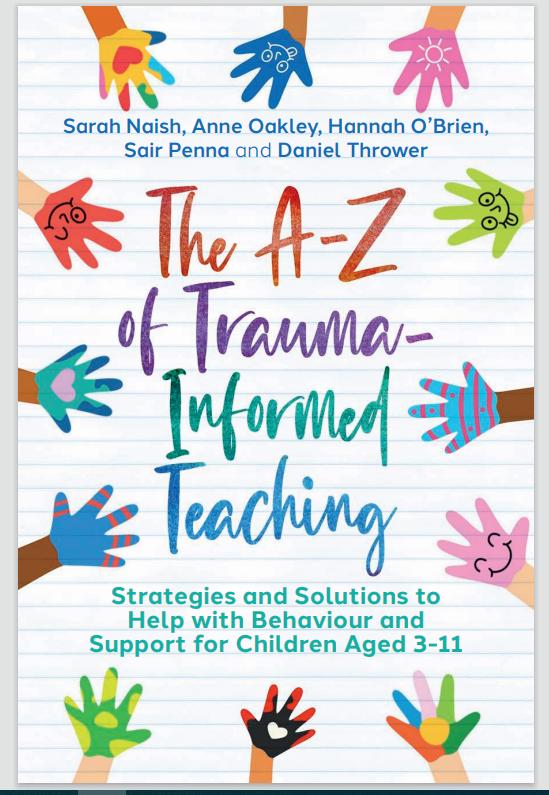

Come and hear from the authors of the new book!
DATE: Thursday 19th October 2023
TIME: 10 am - 4 pm
LOCATION: Coventry.
TICKET PRICE: £90 plus VAT
For more information scan the QR code.

In the Next Issue (Available 20th July 2023) ...
The Summer Holidays Survival guide
Lying and Stealing
Where do I start? - The Basics of Therapeutic Parenting
False Allegations - Dealing with the Allegation Process
Wellbeing - From Feeling Rubbish to Feeling Good.
ISSUE 3 TIP'S MAGAZINE 22

















 Written by Jessica Jackson
Written by Jessica Jackson


 Written By Sair Penna
Written By Sair Penna



 Written By Sarah Naish
Written By Sarah Naish



 WrittenbyLauraTaylor
WrittenbyLauraTaylor










 WrittenBySaraDowling
WrittenBySaraDowling





